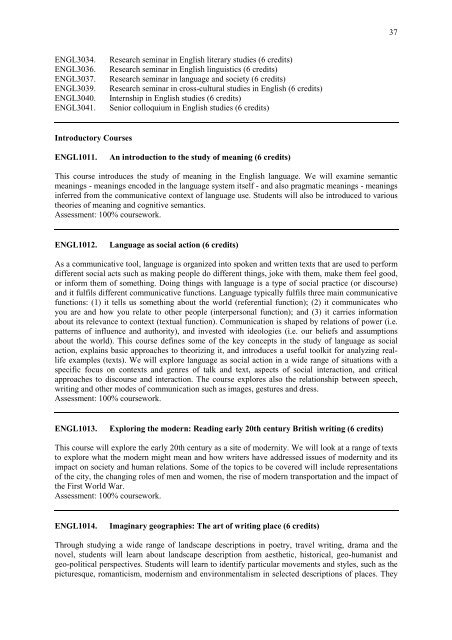(BA) (4-year-programme) - The University of Hong Kong
(BA) (4-year-programme) - The University of Hong Kong
(BA) (4-year-programme) - The University of Hong Kong
Create successful ePaper yourself
Turn your PDF publications into a flip-book with our unique Google optimized e-Paper software.
37ENGL3034.ENGL3036.ENGL3037.ENGL3039.ENGL3040.ENGL3041.Research seminar in English literary studies (6 credits)Research seminar in English linguistics (6 credits)Research seminar in language and society (6 credits)Research seminar in cross-cultural studies in English (6 credits)Internship in English studies (6 credits)Senior colloquium in English studies (6 credits)Introductory CoursesENGL1011.An introduction to the study <strong>of</strong> meaning (6 credits)This course introduces the study <strong>of</strong> meaning in the English language. We will examine semanticmeanings - meanings encoded in the language system itself - and also pragmatic meanings - meaningsinferred from the communicative context <strong>of</strong> language use. Students will also be introduced to varioustheories <strong>of</strong> meaning and cognitive semantics.Assessment: 100% coursework.ENGL1012.Language as social action (6 credits)As a communicative tool, language is organized into spoken and written texts that are used to performdifferent social acts such as making people do different things, joke with them, make them feel good,or inform them <strong>of</strong> something. Doing things with language is a type <strong>of</strong> social practice (or discourse)and it fulfils different communicative functions. Language typically fulfils three main communicativefunctions: (1) it tells us something about the world (referential function); (2) it communicates whoyou are and how you relate to other people (interpersonal function); and (3) it carries informationabout its relevance to context (textual function). Communication is shaped by relations <strong>of</strong> power (i.e.patterns <strong>of</strong> influence and authority), and invested with ideologies (i.e. our beliefs and assumptionsabout the world). This course defines some <strong>of</strong> the key concepts in the study <strong>of</strong> language as socialaction, explains basic approaches to theorizing it, and introduces a useful toolkit for analyzing reallifeexamples (texts). We will explore language as social action in a wide range <strong>of</strong> situations with aspecific focus on contexts and genres <strong>of</strong> talk and text, aspects <strong>of</strong> social interaction, and criticalapproaches to discourse and interaction. <strong>The</strong> course explores also the relationship between speech,writing and other modes <strong>of</strong> communication such as images, gestures and dress.Assessment: 100% coursework.ENGL1013.Exploring the modern: Reading early 20th century British writing (6 credits)This course will explore the early 20th century as a site <strong>of</strong> modernity. We will look at a range <strong>of</strong> textsto explore what the modern might mean and how writers have addressed issues <strong>of</strong> modernity and itsimpact on society and human relations. Some <strong>of</strong> the topics to be covered will include representations<strong>of</strong> the city, the changing roles <strong>of</strong> men and women, the rise <strong>of</strong> modern transportation and the impact <strong>of</strong>the First World War.Assessment: 100% coursework.ENGL1014.Imaginary geographies: <strong>The</strong> art <strong>of</strong> writing place (6 credits)Through studying a wide range <strong>of</strong> landscape descriptions in poetry, travel writing, drama and thenovel, students will learn about landscape description from aesthetic, historical, geo-humanist andgeo-political perspectives. Students will learn to identify particular movements and styles, such as thepicturesque, romanticism, modernism and environmentalism in selected descriptions <strong>of</strong> places. <strong>The</strong>y
















